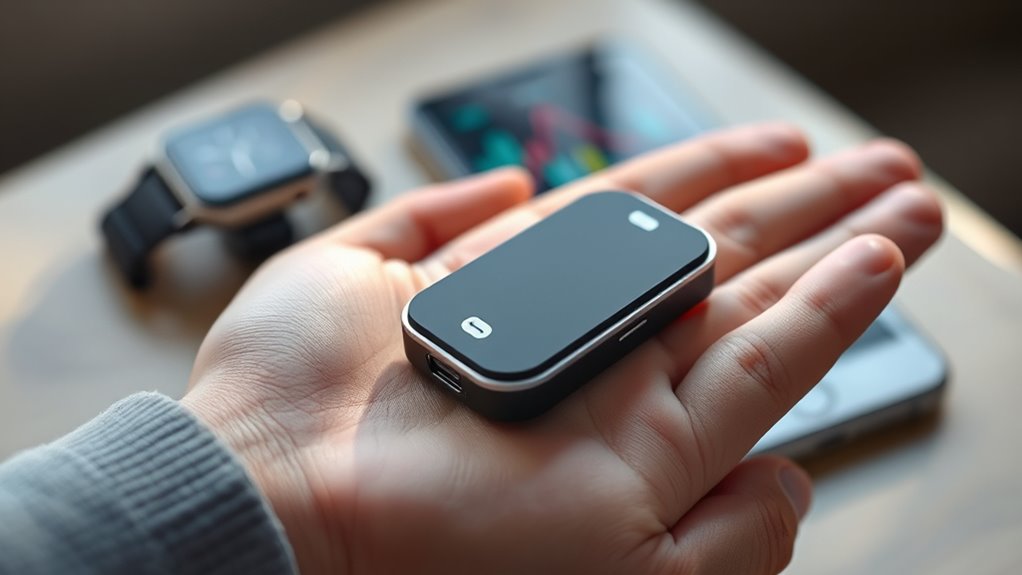Mobile ECG devices are convenient tools that connect wirelessly to your smartphone to monitor your heart’s electrical signals. They’re generally accurate when used properly and validated against standard ECGs, helping detect issues like atrial fibrillation or arrhythmias. Key features include user-friendly design, real-time tracking, and compatibility with apps. While they’re useful for daily monitoring, keep in mind they don’t substitute professional advice. If you continue exploring, you’ll discover how to optimize their use and guarantee reliable results.
Key Takeaways
- Validation studies compare mobile ECG accuracy with medical-grade ECGs, focusing on sensitivity and specificity for detecting arrhythmias.
- Signal quality, user technique, and device calibration significantly influence the reliability of mobile ECG readings.
- Ideal devices feature user-friendly interfaces, real-time monitoring, and compatibility with smartphones for seamless data sharing.
- Mobile ECGs enable daily heart monitoring, early irregularity detection, and sharing data with healthcare providers for personalized care.
- Limitations include potential false positives/negatives and the need for professional diagnosis; proper use and maintenance are essential.
How Mobile ECG Devices Function

Mobile ECG devices work by capturing the electrical signals produced by your heart using small sensors called electrodes. When you place the device on your chest, wrist, or fingers, these electrodes detect the electrical impulses generated during each heartbeat. The signals are then transmitted to the device’s internal processor, which amplifies and records them. Many mobile ECGs use Bluetooth or other wireless technology to send data to your smartphone or tablet. The device’s software analyzes the signals in real time, looking for irregularities or patterns that might indicate heart issues. This process is quick and straightforward, allowing you to record your heart’s activity anytime you need. By continuously monitoring or taking snapshots, these devices help you and your healthcare provider stay informed about your heart health. Additionally, some devices leverage AI in Business techniques like automated insights and pattern recognition to enhance accuracy and provide more comprehensive analysis.
Evaluating the Accuracy of Mobile ECGs

Evaluating the precision of mobile ECGs is essential to ensure they reliably detect heart irregularities. You should look at validation studies comparing device results with standard medical-grade ECGs. These studies measure sensitivity, specificity, and overall accuracy, helping you understand how well the device identifies true positives and negatives. Consider the device’s ability to detect common issues like atrial fibrillation or arrhythmias. Keep in mind that factors such as signal quality, user technique, and device calibration influence accuracy. Reading user reviews and expert analyses can provide additional insights into real-world performance. Ultimately, a device with high accuracy levels guarantees you can confidently monitor your heart health and make informed decisions or seek medical attention when necessary. Device calibration and proper usage are essential to maintaining measurement reliability.
Key Features to Consider When Choosing a Device

When choosing a device, it’s important to contemplate features that directly impact your ability to monitor your heart health effectively. Look for usability, ensuring the device is easy to operate and fits comfortably into your routine. Battery life matters—longer-lasting batteries mean fewer interruptions. Compatibility with your smartphone or tablet can streamline data sharing and analysis. Check if the device provides real-time feedback or detailed reports to track trends over time. Additionally, consider durability and water resistance, especially if you’ll use it frequently or during physical activity. Here are key features to keep in mind:
Prioritize user-friendly design, long battery life, device compatibility, real-time feedback, and water resistance for effective heart health monitoring.
- User-friendly interface
- Battery life and charging needs
- Compatibility with devices and apps
- Real-time monitoring capabilities
- Durability and water resistance
Ensuring the device is suitable for your specific health needs can help maximize its benefits and accuracy.
Practical Applications and Benefits

Mobile ECG devices provide a practical way to monitor your heart health daily, enabling early detection of irregularities and reducing the need for frequent doctor visits. With these devices, you can track your heart rhythm anytime, helping you catch issues like atrial fibrillation or arrhythmias before they become serious. This continuous monitoring allows you to share real-time data with your healthcare provider, leading to more informed decisions and personalized care. They’re especially useful if you have a history of heart problems or risk factors, giving you peace of mind. Additionally, mobile ECGs promote proactive health management, encouraging you to stay aware of your heart’s condition. Understanding GMC tuning can also help you optimize your device’s performance for more accurate readings. Overall, these devices empower you to take control of your health and respond swiftly to potential concerns.
Limitations and Precautions

While mobile ECG devices offer many benefits, they also have limitations you should be aware of. These devices may not detect all heart conditions accurately, especially in complex cases. They can produce false positives or negatives, leading to unnecessary worry or missed diagnoses. User error, such as improper placement or movement during recording, can affect results. Battery life and device durability might also impact usability. Additionally, these devices shouldn’t replace professional medical advice or diagnosis. Always confirm abnormal readings with a healthcare provider. Keep in mind that device data may not be suitable for all medical conditions, especially those requiring detailed analysis. Vetted – Grobal World Ensuring proper device maintenance and understanding its capabilities is crucial for reliable use.
- Ensure correct placement and steady hands during use
- Don’t rely solely on device readings for diagnosis
- Regularly update device software for accuracy
- Be cautious with data privacy and storage
- Seek professional advice for persistent symptoms
Frequently Asked Questions
How Do Mobile ECG Devices Integrate With Other Health Monitoring Systems?
You can integrate mobile ECG devices with other health monitoring systems by syncing data through Bluetooth or Wi-Fi, allowing seamless transfer to apps or cloud platforms. This enables real-time health tracking and easy sharing with healthcare providers. Many devices also support compatibility with electronic health records, so you get an extensive view of your health. Ensuring your device connects smoothly helps you stay proactive about your cardiac health.
What Are the Data Privacy Concerns With Using Mobile ECG Devices?
When using mobile ECG devices, you should be aware of data privacy concerns. Your health data might be stored or shared with third parties, risking unauthorized access or misuse. You need to check the device’s privacy policies, guarantee data encryption, and understand who can view your information. Protecting your sensitive health data helps prevent identity theft and preserves your privacy, so always stay informed about how your data is handled.
Can Mobile ECG Devices Detect All Types of Cardiac Arrhythmias?
Like a watchful lighthouse, mobile ECG devices help monitor your heart, but they can’t detect every cardiac arrhythmia. While they’re great for common issues like atrial fibrillation, some rare or complex arrhythmias may require more advanced testing. You shouldn’t depend solely on these devices for diagnosis. Regular check-ups with a healthcare professional remain essential to guarantee all heart irregularities are accurately identified and properly managed.
How Often Should Users Calibrate or Update Their Mobile ECG Devices?
You should regularly calibrate and update your mobile ECG device to guarantee accurate readings. Check the manufacturer’s guidelines—often, updates are needed every few months or when prompted by the app. Calibration may be required if you notice inconsistent results or after software updates. Keeping your device current helps it function properly, providing reliable data for your health monitoring. Regular maintenance ensures you get the most accurate and useful ECG readings.
Are There Age Restrictions or Limitations for Mobile ECG Device Users?
You might wonder if there are age restrictions for using mobile ECG devices. Generally, these devices are designed for adult use, and children should only use them under medical supervision. Manufacturers often recommend age limits, usually for users over 18 or 16, depending on the device. Always check the specific device’s guidelines and consult your healthcare provider if you’re unsure about suitability for minors or older adults.
Conclusion
Mobile ECG devices are revolutionizing heart health, offering convenience and real-time insights right at your fingertips. While their accuracy is impressive, it is crucial to use them wisely and understand their limitations. Think of these devices as your personal health superheroes—powerful but not infallible. By choosing the right device and staying informed, you can take control of your heart health like never before. Embrace this technology, and your well-being will never be the same again.








